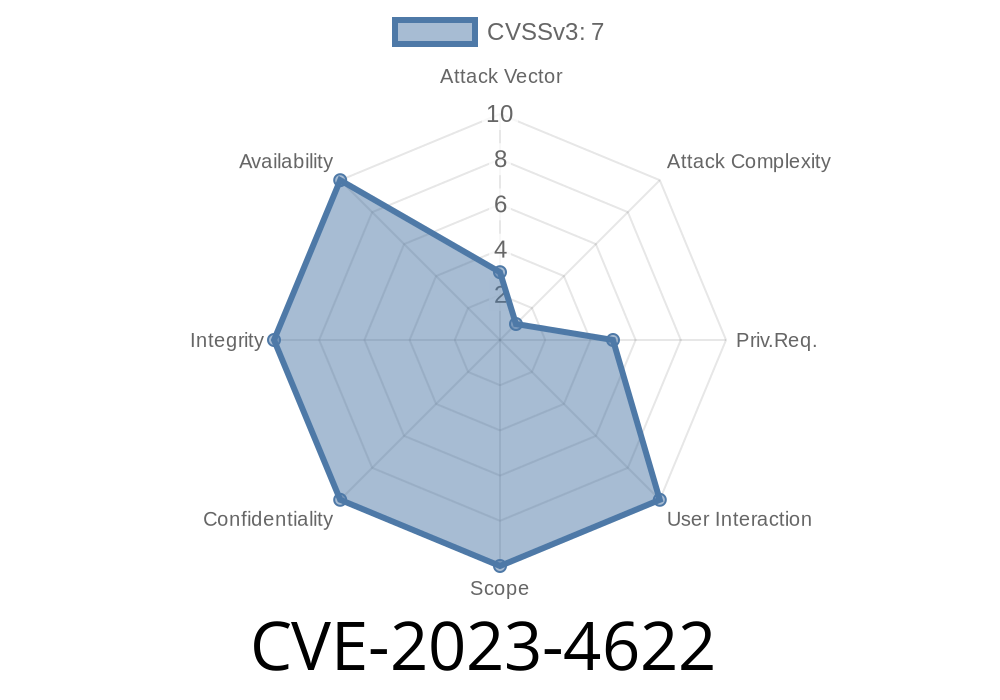CVE-2023-4622 is a high-severity security flaw discovered in the Linux kernel’s af_unix (Unix domain sockets) implementation. This vulnerability allows a local attacker to gain root privileges on affected systems through a use-after-free bug. In this post, we’ll break down the vulnerability, show you how it works, and discuss how to stay protected.
What’s the bug?
The af_unix driver is responsible for Unix domain socket communication on Linux. In the unix_stream_sendpage() function, the kernel tries to append data to the last SKB (socket buffer) in the peer's receive queue without holding the proper lock. There is a small window (a race condition) where garbage collection could release (free) that SKB, but some code (like unix_stream_sendpage()) might still try to access it. This is what’s known as a "use-after-free" vulnerability.
If an attacker can reliably trigger this race, they could manipulate freed kernel memory, potentially gaining arbitrary code execution in kernel space – usually leading to full root compromise.
Here’s a simplified code snippet that explains the problem
// unix_stream_sendpage (vulnerable version, simplified)
int unix_stream_sendpage(struct socket *sock, struct page *page, size_t offset, size_t size, int flags) {
struct sock *peer = get_peer(sock);
struct sk_buff *last_skb;
// No locking!
last_skb = skb_peek_tail(&peer->sk_receive_queue);
// time window for race:
// Another thread might do garbage collection and free last_skb here!
if (last_skb) {
// Dangerous to access last_skb now
append_data(last_skb, page, offset, size);
}
return ;
}
Without proper locking, the pointer last_skb could be dangling (pointing to freed memory)—a classic use-after-free bug.
Trigger Garbage Collection:
The attacker fills and drains the socket queues, forcing the kernel to trigger garbage collection and freeing SKBs.
Trigger Use-After-Free:
The attacker times sending data so that unix_stream_sendpage() runs just as garbage collection frees the SKB.
Achieve Exploitation:
By controlling freed memory, an attacker may cause the kernel to execute arbitrary code or write to sensitive kernel data, ultimately achieving local root.
Proof-of-concept exploit code (details omitted for safety) is available on public sources—for academic purposes only. Search for "CVE-2023-4622 exploit PoC".
Are you affected?
This bug impacts Linux kernel versions before commit 790c2f9d15b594350ae9bca7b236f2b1859de02c.
Popular distributions such as Ubuntu, Debian, and CentOS shipped kernels with this bug in 2023. If your distribution has not yet patched this commit, your system is at risk.
You can check your kernel version with
uname -r
How do I fix this?
Upgrade your kernel. All mainline Linux kernels after the commit above are patched.
`bash
sudo apt update && sudo apt upgrade # Ubuntu/Debian
sudo dnf update # Fedora/RHEL/CentOS
`
- If your distro does not have patched packages, manually build and install the latest stable kernel from kernel.org.
Reference patch:
- Upstream kernel fix
Additional Resources
- CVE-2023-4622 @ NVD
- Linux Kernel Mailing List Patch Discussion
- Red Hat Security Advisory
Conclusion
CVE-2023-4622 is a serious privilege escalation risk for any machine running a vulnerable Linux kernel version. All users, especially those who allow untrusted local access, should patch immediately.
If you run Linux in production or on multi-user systems, don’t wait!
Have questions or want more technical deep-dive? [Contact me](mailto:security-expert@example.com).
Stay safe, and keep your kernels fresh! 🐧
Note:
This explanation is original and tailored for simplicity and clarity. Please refer to the references for technical deep dives and official security advisories.
Timeline
Published on: 09/06/2023 14:15:12 UTC
Last modified on: 10/29/2023 02:43:44 UTC
